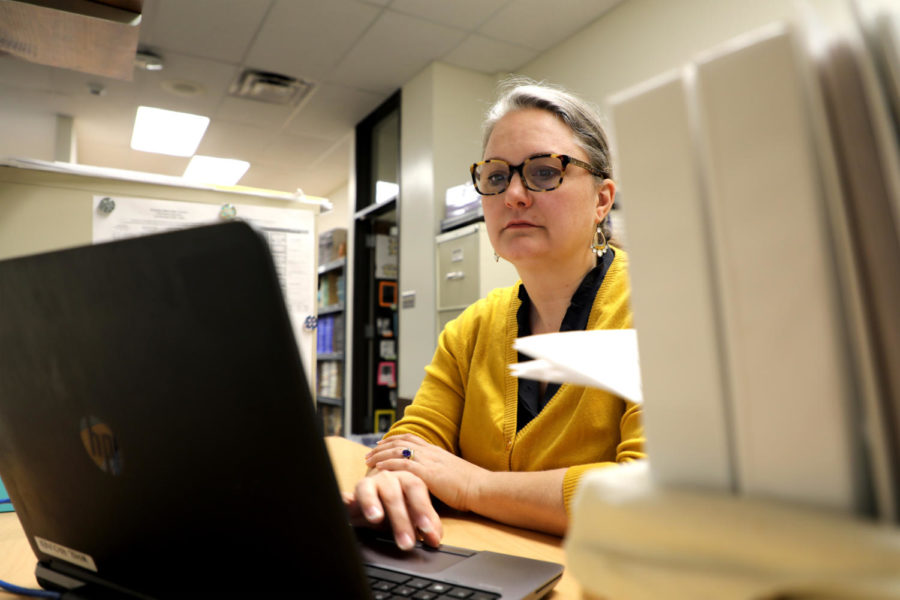While their peers are just waking up in the morning, a select group of accelerated eighth graders are already sitting in their first period in a high school classroom. For the last seven years, through the Eighth Grade Acceleration program, students have been attending high school to take advanced math and science courses.
“The kids come over [to] the high school [because] the idea is that they’ve run out of classes over at the middle school. Any student who really needs to come over and take either Biology, Geometry, Honors Biology or Honors Geometry can do so, if they need it, which is when they’ve met the requirements down at the middle school,” teaching assistant Rose Rouner said.
Many of these students are from the MOSAICS Academy program and have been together in classes since the third grade.
“It’s a nice transition for them to come to West High prior to high school and be in classes with students who challenge them. It’s good for them to be in a variety of learning environments,” Rouner said.
Due to the growth of the program, the eighth-grade students were split up into two Honors Biology classes with two different Biology teachers this year.
“I think the best part [of the accelerated program] is to enable the younger gifted students to be able to take all of our accelerated science courses,” Biology teacher Sally Soulier said. “That means if they’re starting early, they don’t have to make so many hard decisions about which classes not to take. They can take more classes because they started one year earlier.”
Despite the focus of the program on accelerated classes, the transitions for freshman Salam Hadji were not solely academic.
“[The most difficult part about being at high school as an eighth grader was] in the middle school, when you’re in the same classes as other people your age, they relate to you and talk to you more,” Hadji said. “When you’re taking Honors Geometry and Honors Biology, they sometimes distinguish you as being better than them so they kind of isolate you, and then you don’t get to talk to them or you don’t get to hang out with other people.”
After one semester into freshman year, Hadji is thankful she was a part of this program.
“[The program] helped me know what I need to gear towards. It also helped me know my passion for things because last year I didn’t know what I wanted to be, but now I know what I want to be, because of those classes,” Hadji said. “I want to be a doctor because [of] Biology. At first, it was hard for me, but then I realized ‘hey, this is fun!’ My mom also always wanted me to be a doctor and then I realized this is actually what I want to be.”
While there are certain academic benefits, this program can be concerning socially and mentally.
“A concern that I have applies not only to the accelerated honors program for MOSAICS students but for all of our accelerated students. When a student shows themselves to be capable and hardworking, I think sometimes we say ‘oh, well you can do more. If you can do this much, then you can do more.’ I feel like at times it’s never-ending. No matter how much you can do, there is more that you can do,” Soulier said.
Soulier worries that students are being overburdened with too high of expectations.
“I’m not criticizing students about taking advanced classes, but I do feel like every student, every parent, every teacher, every administrator ought to be considering the total volume of work hours that the student is expected to be doing, and we should sometimes advise kids to say ‘no’ to doing too much,” Soulier said.
These kids have to navigate a longer school day, a more challenging course load and an extra bus ride in the middle of the day. Rouner tries to make sure that everything goes smoothly with the overall transition from middle school to high school for both the students and their parents.
“I wish people knew that just because kids are in higher level classes doesn’t mean that everything comes easy to them,” Rouner said. “These students are smart, but being smart doesn’t make other skills easier. Just like other students, they have to learn time management, organization, good study habits and how to manage stress, in order to be successful in the classroom.”




![Smiling in a sea of Longhorns, Fox 2 reporter Ty Hawkins joins junior Darren Young during the morning Oct. 3 pep rally. The last time West was featured in this segment was 2011. “[I hope people see this and think] if you come to [Parkway] West, you will have the time of your life because there are so many fun activities to do that make it feel like you belong here. I was surprised so many people attended, but it was a lot of fun,” Young said.](https://pwestpathfinder.com/wp-content/uploads/2025/10/Edited2-1200x798.jpg)
![West High seniors and families listen as a representative of The Scholarship Foundation of St. Louis, Teresa Steinkamp, leads a Free Application for Federal Student Aid (FAFSA) workshop. This session, held in the library, provided guidance on financial aid, scholarships and student loan options. “This event is very beneficial for any seniors who are applying to or considering applying to colleges after high school [because] the cost of college is on the rise for seniors and parents,” college and career counselor Chris Lorenz said.](https://pwestpathfinder.com/wp-content/uploads/2025/09/DSC_4478-1200x778.jpg)
![Senior Kamori Berry walks across the field during halftime at the Homecoming football game on Sept. 12. During the pep assembly earlier that day, she was pronounced Homecoming Queen. “I thought it was nice that the crowd [started] cheering right away. I know [my friends] were really excited for me, and my family was happy because typically non-white people don't win,” Berry said.](https://pwestpathfinder.com/wp-content/uploads/2025/09/DSC7046-Enhanced-NR-1200x798.jpg)



![Pitching the ball on Apr. 14, senior Henry Wild and his team play against Belleville East. Wild was named scholar athlete of the year by St. Louis Post-Dispatch after maintaining a high cumulative GPA and staying involved with athletics for all of high school. “It’s an amazing honor. I feel very blessed to have the opportunity to represent my school [and] what [it] stands for,” Wild said.](https://pwestpathfinder.com/wp-content/uploads/2025/05/unnamed-6-1200x714.jpg)
![The Glory of Missouri award recipients stand with their certificates after finding out which virtue they were chosen to represent. When discovering their virtues, some recipients were met with contented confirmation, while others, complete surprise. “I was not at all surprised to get Truth. I discussed that with some of the other people who were getting the awards as well, and that came up as something I might get. Being in journalism, [Fellowship of Christian Athletes and] Speech and Debate, there's a culture of really caring about truth as a principle that I've tried to contribute to as well. I was very glad; [Truth] was a great one to get,” senior Will Gonsior said.](https://pwestpathfinder.com/wp-content/uploads/2025/04/Group-Glory-of-Missouri.jpg)



